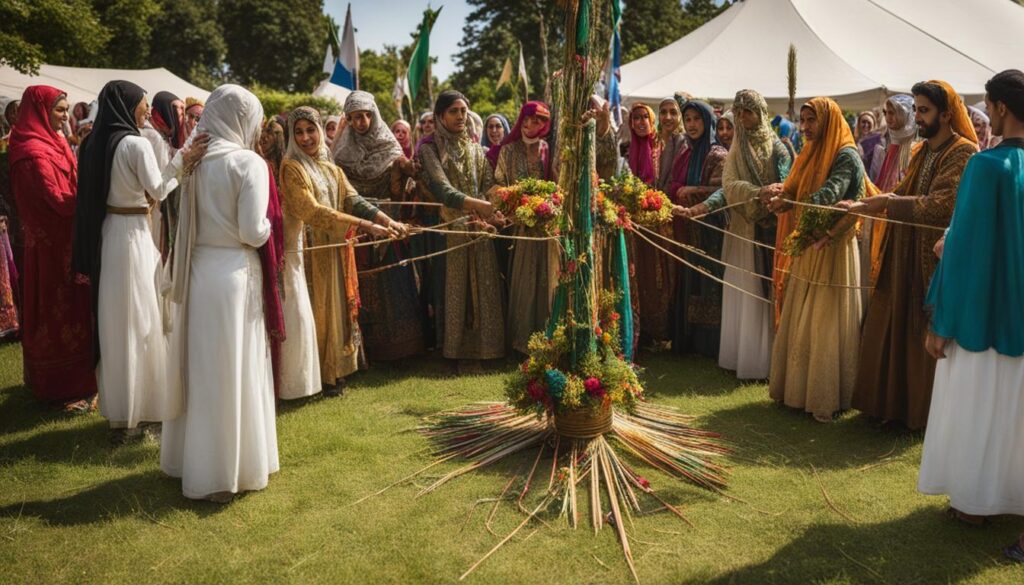When it comes to holidays, Muslims have specific religious observances that they adhere to. While they do celebrate two official holidays, Eid al-Fitr and Eid al-Adha, there are many other holidays and occasions that they do not observe. Understanding the reasons behind these non-celebrations helps shed light on the cultural and religious practices of Muslims worldwide.
Key Takeaways:
- Muslims celebrate two official holidays, Eid al-Fitr and Eid al-Adha.
- There are other holidays and occasions that Muslims do not celebrate.
- Muslims do not observe holidays and festivals that have no religious significance in Islam.
- The perspective on celebrations with religious or pagan origins varies in Islam.
- Muslims make decisions about participating in celebrations based on their understanding of Islamic teachings and the cultural context in which they live.
The Two Official Islamic Holidays: Eid al-Fitr and Eid al-Adha
Muslims worldwide celebrate two official holidays in Islam, known as Eid al-Fitr and Eid al-Adha. These holidays hold great religious significance and are determined by the lunar Islamic calendar.
Eid al-Fitr, also known as the Festival of Breaking the Fast, marks the end of the holy month of Ramadan, during which Muslims engage in fasting from dawn to sunset. This joyous occasion is a time for Muslims to come together with family and friends, share meals, and exchange gifts as they break their fast. It is a celebration of gratitude, renewal, and spiritual growth.
Eid al-Adha, also known as the Festival of Sacrifice, is commemorated during the Hajj pilgrimage, an annual pilgrimage to the holy city of Mecca. This holiday honors the willingness of Prophet Ibrahim (Abraham) to sacrifice his son Ismail (Ishmael) as an act of obedience to God. Muslims remember this act of devotion by sacrificing an animal and distributing its meat to the less fortunate. It is a time of charity, reflection, and unity.
During both Eid al-Fitr and Eid al-Adha, Muslims engage in prayers, attend special sermons at mosques, and participate in acts of charity. They also dress in traditional attire, visit relatives, and share meals together. These holidays are considered the holiest days of the Islamic year and are filled with joy, gratitude, and a deep sense of spiritual connection.
Non-observed Holidays and Occasions
In addition to the two official Islamic holidays, Muslims do not observe other holidays and occasions that may be celebrated by other cultures and religions. This includes birthdays, anniversaries, and cultural festivals that have no religious significance in Islam. Muslims do not consider these celebrations as part of their religious practices and do not participate in them.

The Perspective on Celebrations with Religious or Pagan Origins
In Islam, there is a perspective on celebrations with religious or pagan origins. Muslims consider the historical context and religious significance of a particular celebration, but they also assess the current perception and cultural acceptance of the event. If a celebration no longer holds religious bearings and is widely regarded as a cultural phenomenon, it is permissible for Muslims to participate in it.
Islam places emphasis on the present context rather than the historic origins of celebrations. The focus is on understanding the intentions and actions associated with the celebration in the current time. While the origins of a celebration may have religious or pagan roots, Muslims make decisions about participation based on their understanding of Islamic teachings and the cultural context in which they live.

This perspective allows Muslims to engage in celebrations that have transitioned from their original religious or pagan significance and are now recognized as cultural traditions. It recognizes the importance of cultural diversity and promotes understanding and tolerance of different traditions within the larger context of Islamic principles.
Conclusion
In conclusion, Muslims do not celebrate certain holidays beyond the two official Islamic holidays, Eid al-Fitr and Eid al-Adha. These two holidays hold great religious significance and are observed by Muslims worldwide. However, Muslims also refrain from participating in other holidays and occasions that have no religious significance in Islam.
The perspective on celebrations with religious or pagan origins in Islam focuses on the current context and perception rather than the historic origins. Muslims make decisions about participating in celebrations based on their understanding of Islamic teachings and the cultural context in which they live. If a celebration is widely accepted as a cultural phenomenon and no longer has religious bearings, it may be permissible for Muslims to participate in it.
Overall, the observance of holidays in Islam is centered around the two official Islamic holidays and the adherence to religious practices and customs. Muslims maintain a deep respect for their faith and make conscious choices about which celebrations align with their religious beliefs, ensuring that the focus remains on the spiritual aspects of their lives.
FAQ
What holidays do Muslims not celebrate?
Muslims do not celebrate certain holidays and festivals beyond the two official holidays in Islam, namely Eid al-Fitr and Eid al-Adha.
What are the two official Islamic holidays?
The two official Islamic holidays are Eid al-Fitr and Eid al-Adha.
What is the significance of Eid al-Fitr?
Eid al-Fitr marks the end of Ramadan, a month of fasting, and is considered the holiest day of the Islamic year.
What is the significance of Eid al-Adha?
Eid al-Adha is celebrated during the Hajj pilgrimage and is also considered one of the holiest days of the Islamic year.
What other holidays and occasions do Muslims not observe?
Muslims do not observe holidays and occasions such as birthdays, anniversaries, and cultural festivals that have no religious significance in Islam.
What is the perspective on celebrations with religious or pagan origins in Islam?
In Islam, the focus is on the current context and perception of celebrations with religious or pagan origins. If a celebration is no longer religious and is widely accepted as a cultural phenomenon, it is permissible for Muslims to participate in it.

